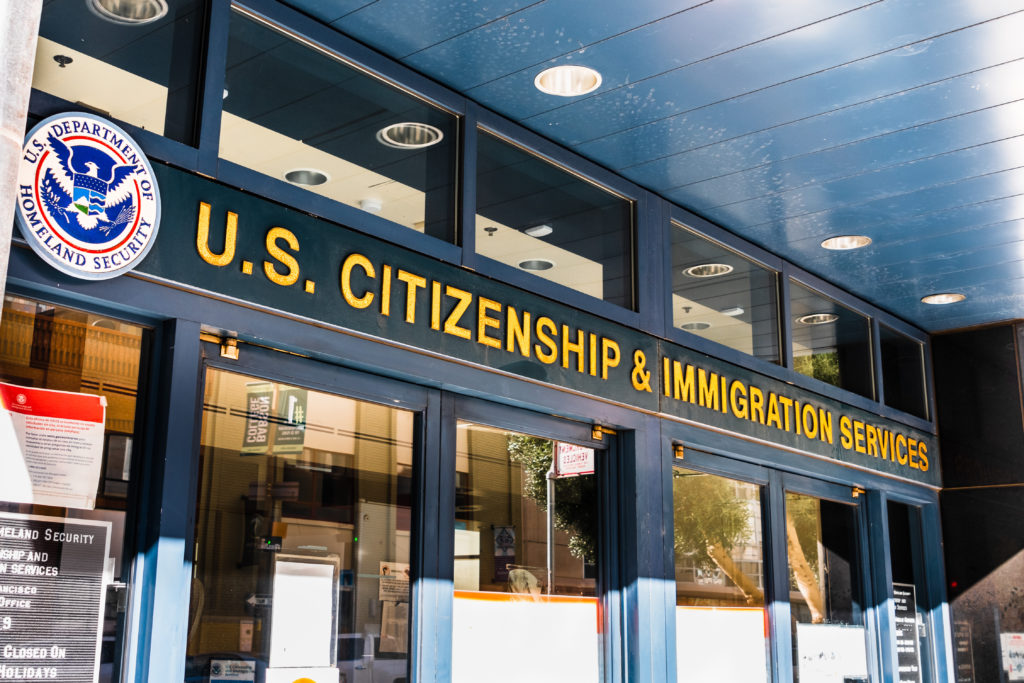
You’ve rushed to make it to your green card interview on time. You ate a skimpy toast and jelly breakfast before you headed out. You carefully avoided reckless speedsters and lane changers on the freeway and then manuevered around large trucks on the streets moving slightly faster than a wounded snail. You breath a sigh of relief. You’re on time.
You’re ready for your big moment. You’re glad that you took time to put your face mask in your purse the night before and your papers are loosely thrown together in a tote bag. All you need now is for the others to arrive. You walk up to the security guards.
Little do you suspect that you have already run afoul of the new COVID-19 rules for USCIS interviews.
When you get to the door of the building, the officer tells you that you’re too early. He tells you that you have to go back to your car to ensure social distancing until it’s closer to your appointment time. He asks if you brought a mask for your six-year old daughter.
You return to the door 30 minutes later. The guard questions if you’re attending with just your daughter, or if anyone else is meeting you.
You’re expecting your interpreter, your attorney, and your husband to arrive shortly. The officer informs you that you cannot enter until everyone can enter. He also tells you that some, or all, of them may not be able to go inside with you.
That’s the new reality of marriage green card interviews in the COVID-19 era.

Coronavirus And Immigration: The New Normal Of Permanent Residence Interviews
It’s amazing, really. How the Coronavirus has turned our world upside-down in so many ways.
The impact has spared no one.
For several months, immigration offices were closed in the early stage of the pandemic. Over time, they were gradually reopened.
As they reopened, changes had to be made to the operating procedures of immigration offices across the nation – changes immigrants should know about before they go to their interviews for permanent residence.
With these changes, there is a greater emphasis placed on the individual responsibility of immigrants to be prepared to answer questions and address concerns at their interviews, without the help of supportive persons.
To avoid negative setbacks, immigrants and their families need to adapt to this new normal as quickly as possible.
Towards that end, this article briefly addresses the procedural changes caused by the COVID-19 disruptions, primarily in the context of immigration spouses seeking a green card through marriage.
8 Insights For Survival (And Success) At Your Green Card Interview During COVID-19
- Who Can Attend Your Interview?
- Are You Required To Wear A Mask?
- Can You Bring Children?
- For Green Cards Through Marriage, Are Spouses Allowed?
- Can You Bring An Interpreter?
- Can An Attorney Represent You?
- Are There Special Arrival Times And Entrance Rules?
- Did You Prepare In Advance To Represent Yourself?
(These rules also apply to applicants for citizenship and other immigration benefits.)
1. Who Can Attend Your Permanent Residence Interview?
Let’s begin with who can attend your USCIS interview with you.
In most cases, family members are not permitted to enter the government building. They must now wait outside. They are not allowed to sit in the waiting room. Seats are blocked off to ensure proper social distancing.
There is an exception for family members who are an integral part of your case and whose presence is required at the interview – such as a husband or wife who is your petitioner, or a U.S. born son or daughter who is is sponsoring you for a green card.
This is true even for elderly immigrants, like those trying to become naturalized citizens, who may be required to enter alone and then must struggle alone to the second or third floor if the government office is located in a multi-floor building.
If an applicant has physical disabilities, then the individual who is responsible for helping them is allowed to enter.
2. Are You Required To Wear A Mask?
Everyone who enters must wear a mask that covers their nose and mouth. They must keep this on at all times, even during their interview.
The officer might ask you to briefly remove it to take your facial biometrics and eye scans. Other than that, there are no exceptions to the mask requirement.

3. Can You Bring Children?
It’s best to leave minor children with a friend, family member or babysitter at home. Unless, of course, you’re trying to immigrate a young child.
However, if you bring children, those 2 years and older will be allowed to enter only with a protective face covering.
4. If You’re Seeking A Green Card Through Marriage, Is Your Spouse Allowed?
As I mentioned a moment ago, if your spouse is your petitioner, he or she will be allowed to enter.
But don’t be surprised if the two of you are separated. You may be interviewed separately.
In some USCIS locations, only one person at-a-time is allowed in the officer’s room as the government tries to ensure proper social distancing. This is especially true for buildings that have smaller-size work stations.
Or your spouse may be interviewed in a different room.
On the other hand, your husband or wife may have to listen through the open doorway, and participate from the hallway, or sit in a different room and participate via a USCIS telephone set-up.
5. Can You Bring An Interpreter With You To The Interview At USCIS?
No. Interpreters are not allowed to attend the USCIS interview with you. You might be thinking, “Well, wait a minute. How am I supposed to understand the officer without someone to help translate?”
Interpreters can still appear. But they must do so telephonically. And they have to fill out a special form, Form 1256, known as a Declaration For Interpreted USCIS Interview.
This form must be filled out and signed by the translator in advance. (In the pre Covid-19 days, it would be signed on the day of your interview in the presence of the USCIS agent.)
In addition, you will need to provide the interpreter’s telephone number to the government officer. The officer will then call the translator.
This means your translator must be on standby, which requires you should be careful to select a responsible person to assist you. Better yet, hire a professional interpreter.
You do not want to have a friend or family member serve as your translator who is neither compentent nor impartial enough to help you and the government officer understand each other.
6. Can An Attorney Represent You At Your Immigration Interview?
Attorneys can attend your USCIS appointments. At most offices, the guards at the door won’t allow you or your attorney to enter alone if you are planning to have an attorney present at your interview. Whoever arrives first has to wait outside until both of you are present.
Lawyers, like interpreters, can attend telephonically. To appear by telephone, attorneys must fill out and sign Form G-28, Notice Of Entry of Appearance As Attorney, in advance.
This form is given to the USCIS officer at the outset of the interview by the immigrant who is about to be questioned.
At that point, you should give your attorney’s telephone number to the officer. In turn, the USCIS officer should call the attorney so that he is present at the green card interview.
Having a lawyer at your interview is a legal right.
Unfortunately, some stories have surfaced about immigrants being discouraged from contacting their attorneys by telephone on the day of their interview.
Do not – I repeat, do not – let officers persuade you not to call your attorney, even if they say that your interview will be short and simple.
Another brief yet critical pointer here.
The more difficult or complex the issues will be at the interview, or the less confident you feel going alone, the more important it is that your attorney attends in person.
It is your responsibility to hold your lawyer’s feet to the fire.
As a permanent resident attorney, I have heard too, too many horror stories about what took place at USCIS green card interviews when the immigrant’s lawyer did not show up.
Even if your attorney does appear in person, as mentioned earlier regarding your spouse or other sponsoring relative, he or she may not be allowed to sit in the interviewer’s room with you. They, too, may have to participate from an open door and hallway, or sit in a different room, listen in and contribute through the USCIS telephone system.
Nonetheless, that is still preferred to being alone, especially when you will face legally tough issues or you simply feel afraid about going alone to your interview.

7. Are There Special Arrival Times And Entrance Rules?
In the past, I have encouraged clients to arrive at the government facility at least ½ hour early. Given the need to keep socially distant, the government has indicated that they do not want anyone showing up more than 15 minutes earlier than the scheduled time of their appointment.
This means if you’re meeting someone there, like your attorney or your petitioning family member, neither of you should get in line sooner than 15 minutes before it’s your time to enter.
However, I still encourage clients to arrive at least 30 minutes early. We can meet in the parking lot, away from the building entrance to go over last minute details. As stressed in Don’t Make These 8 Marriage Green Card Mistakes, I do not like taking a risk they might get trapped in traffic and not be on time for their appointment.
Know this as well. If you are waiting to meet another person, at some offices you will not be granted entry into the building until your entire party is present. (And, of course, everyone must be wearing a protective mask.)
Remember to keep your political views in check. Whatever your political affiliation, keep it private. All officers from the security guards standing outside to the interviewers inside the USCIS rooms will be wearing masks. Upon entry, you will be required to answer screening questions to determine if you have, or did have, Covid-19.
Those are the rules. Go with the flow.
8. Did You Prepare In Advance To Minimize Anxiety And Document Sloppiness?
You should also be aware that USCIS offices where interviews are being conducted have been equipped with plexiglass dividers to keep both officers and applicants safe from the danger of spreading COVID-19 inadvertently. This makes exchanging documents slightly cumbersome.
What this means is that you cannot wait until the last minute to prepare for your interview. You need to organize your papers and evidence a few days beforehand to ensure you can find the correct materials being requested by an officer in a prompt and systematic manner.
You don’t want your documents falling all over the floor when you’re trying to find a simple birth certificate, right?
By so doing, the stress you save will be well worth the time you spent getting ready. Most immigrants feel a lot of anxiety on the day of their interview. The more you reduce the sources of frustration you can control – like finding a document quickly that the interviewer officer wants to review – the better your chances for staying composed and success.
Why The Long-Term Effect Of COVID-19 May Reap Positive Dividends For Immigrants
These rules are the new reality for immigration interviews.
Like them or not, because there is no time frame for the end of COVID-19, you should plan for these rules to still be in effect on the day of your permanent residence interview.
Even if the impact of the Coronavirus is slowed, or an effective vaccination is developed, this does not mean the public will be able to lower its vigilance. The fight against COVID-19 may linger for many months, perhaps years, and some of our existing protective strategies will need to remain in place.
There is a silver lining.
Over the years, many immigrants and their supporters have been too lax in their efforts to earn permanent resident status. Procrastination and carelessness have undermined their dreams and hopes of living and working legally in the United States.
Now such traits are absolutely unacceptable – not that they ever really were.
By having to attend green card interviews alone without supportive persons in some cases, and in others with them situated in hallways or connected via a telephone line, immigrants must assume greater personal responsibility for the presentation of their cases.
To the extent immigrants take the new rules seriously, they will play a more active role in understanding and developing the issues in their cases.
And that’s a good thing.
By Carlos Batara, Immigration Law, Policy, And Politics




